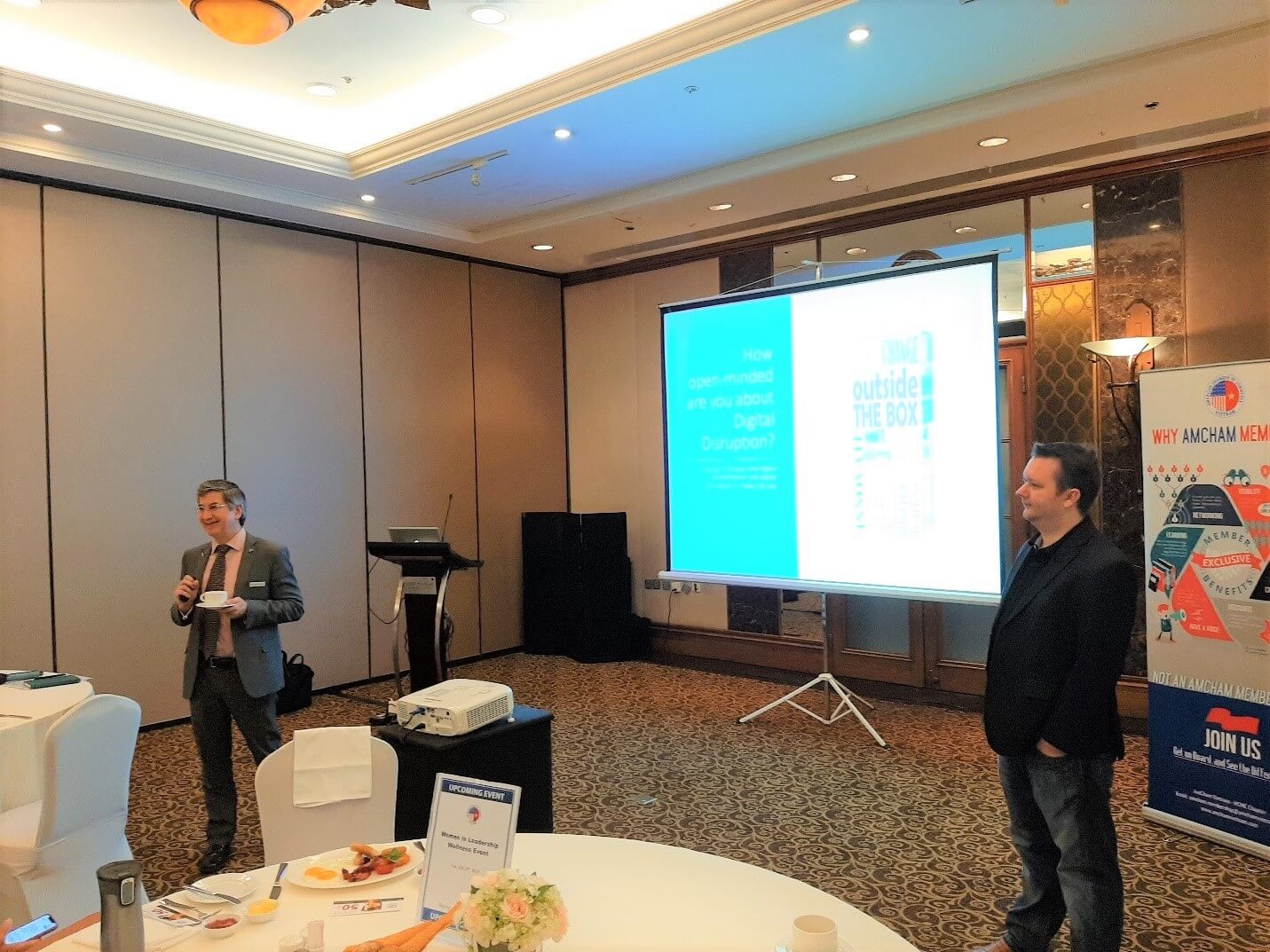October 24, 2019 – As an industry veteran with more than 40 years of diverse experience in many industries, Rick Yvanovich, Founder and CEO of TRG International, often hosts events meant to educate and help businesses navigate the ever-changing business environment they are facing.
This time, the event was hosted by AmCham, and the topic was on digital disruption and digital transformation, what drives these processes and how businesses can protect themselves from the threats they present. Joining the discussion with Rick was Andrew Duck, who is Founder and CEO of Aversafe and has more than 17 years of experience in software development and executive leadership.

Digital Transformation
The first half of the event was spent on discussing digital transformation and several myths that surround this topic.
Before taking the reins and debunking the myths, Rick and Andrew asked the participants to discuss amongst themselves what they believe are the main difficulties associated with technology and digital transformation.
The difficulties the participants presented varied greatly from data storage and usage to hiring employees with the skillsets that would allow them to utilise the new systems that pervade today’s business world.
At the end of the discussion, all participants agreed that digital transformation is essential, but companies still do not know what to do nor have the right people with the right skills to execute it.
Read more: Protect SMEs in today's competitive & threatful digital economy

After hearing the difficulties from the audience, Rick and Andrew went on to debunk five digital transformation myths.
Myth #1: “Every company should digitally transform.”
This myth immediately answered many of the questions that had been presented by the participants. The reality of this myth is that not every company (or every business process) needs to be digitally transformed, especially if the business cannot develop a business model out of its processes. If you do not know how they work, how are you going to transform them?
Read more: Why most digital transformation projects fail?
Myth #2: “Digital transformation leverages emerging or disruptive technologies.”
The reality is that transformation and disruption does not come from radically new technology but ‘conventional’ operational and strategic technology.
An example given was Uber. They did not disrupt the taxi industry by utilising completely new technology, but by transforming how you get a ride and who provides the ride.
Myth #3: “Profitable companies are most likely to launch successful digital transformation projects.”
In successful companies where things have been going well for a while, there will be a very small window of chance for transformations, and employees are more prone to resist digital change. In contrast, start-ups are more likely to make radical changes and take risks as they have nothing to lose.
Myth #4: “We need to disrupt our industry before someone else does.”
In reality, transformation and disruption come from start-ups who make bold bets on old industries as the market and industry leaders tend to not divert from their proven and tried business models.
Myth #5: “Better technology is a Key Point of digital transformation.”
This final myth answered many concerns that the participants had. Technology is important but changing your business internally, your organisational structure, organisational culture, your mindset, how your leadership works and how you react to change are equally crucial. This was also the focal point of the event.
Read more: How the high-tech giants establish successful corporate cultures
All of these myths funnel into the idea of digital disruption. But if the disruption is not driven by technology, what is it driven by?
Digital disruption
To simply put, digital disruption is driven by your customers. Your customers are ever-changing, and the value they want from their products changes with them.
Companies like Uber, Amazon, and Airbnb did not become market leaders by utilising better technology; they won by accurately identifying the problems the consumers were having in the value chain, changed how that part worked, and then using technology to enable that change.
Read more: Digital transformation - Less hype, more practicality
Uber changed how getting from A to B not by utilising a new and incredible technology but by changing how you get a ride and who provides the ride.
Amazon changed how buying a book works, not by revamping bookstores, but by eliminating the need to leave our house, visit a store to find and purchase a book.
Airbnb did not create revolutionary technology but, like Uber, changed whom you rent a room from and how you rent the room.
There are three ways to decouple the value chain and achieve results similar to what Uber, Airbnb, and Amazon did.
- Value-creating decoupling
- Value-eroding decoupling
- Value-charging decoupling
Value-creating decoupling
The example given is Twitch, a streaming service where users get to livestream themselves playing video games and interact with viewers. Twitch decoupled the value of playing video games and replaced it with the act of watching the game alongside a community of people all involved in the same game and same interests.

Value-eroding decoupling
In a customer value chain, there will often be an eroding action that consumers do not enjoy. Let’s continue with the gaming example with Steam.
Steam found a problem in the normal value chain of buying a video game, namely having to go to the store, buy the game, go home, and install it before you can play it. Therefore, they launched an online platform where you can buy any game from their online store which giving you instant access to play, thus, removing the entire process of visiting a physical store.

Value-charging decoupling
Supercell, a service that allows their customers to play games for free and later charges a small fee for some features, removed the need to buy games altogether. Supercell empowers their customers just to play games which completely changed the value of getting a game because the consumer no longer needs to pay upfront for their entertainment.

As you can see in all of the above examples, it is never a new and innovative pieces of technology that allowed these companies to disrupt their industries but their ability to find a link in the value chain that is weak and improve it by making it easier to do, reducing its cost, or reducing the time it takes.
How do you predict where disruption could happen in your industry?
To protect and prepare yourself for a possible disruption in your industry, you need to listen to your customers and rethink your business.
Read more: 7 disruptions CIOs may not see coming, according to Gartner
As stated earlier, your customers are ever-changing, and they will be the ones to drive the disruption. Therefore, you need to listen to your customers as the problems they are having with the value chain in your industry is where disruptive companies will enter.
After figuring out where your customer’s troubles lie, you need to rethink your business. Set aside all your preconceived notions about how your industry works and how you think your business should run, and think about how you would build your business today. What would you change to meet the customer’s demands? How would you do it? And remember, it is not about finding the best technology but meeting the needs of your customers in the best way possible.
TRG Talks
Every month, TRG hosts three free events similar to this talk on digital disruption on Project Management, Cloud enablement, and Talent Management. The TRG Talk series feature industry leaders as speakers that all share their knowledge and ask you to not only listen but actively participate in discussing the issues presented to get you to really think about how your business could improve using this knowledge.
For more information about each Talk in the TRG Talk series, please CLICK HERE.

Never miss out on any of TRG associated events by subscribing to TRG event newsletter today!
 English
English  Vietnamese
Vietnamese 

